Electric vehicles (EVs) are becoming an attractive business proposition for high-mileage vehicle operators like Uber in some EU capitals, a new study suggests.
The new study, from Transport and Environment (T&E), does not include London in its analysis, but highlights the cost advantages of EVs in cities such as Paris, Berlin, Madrid and Lisbon.
Medium-sized battery EVs, such as the Nissan Leaf, are on average 14% cheaper to run than equivalent diesels today, if slow charging overnight near home and/or fast charging at preferential rates are available, it says.
The savings can be even higher (24%) in the case of Parisian drivers.
In monetary terms, these savings amount to €3,000 (£2,700) every year, because of cheaper electricity, lower EV retail prices and higher purchase incentives in France.
T&E says that the taxi and ride-hailing markets are best positioned to go fully electric first.
The economics of EVs - more expensive to buy but a lot cheaper to run - match perfectly with high-mileage, low-margin businesses like ride-hailing and taxis, the research suggests.
Uber-type drivers can travel up to five times the mileage of an average motorist.
Yoann Le Petit, new mobility expert with T&E, said: “This is a win-win-win situation for drivers, citizens and the planet.
“The sooner Uber and taxis go 100% electric, the sooner citizens will enjoy cleaner air.”
In London, the Mayor’s EV infrastructure taskforce estimates that 70% of the demand for slow and normal chargers in residential areas will come from Uber drivers alone.
Charging is a key barrier for the uptake of EVs by professional drivers, because slow charging is cheaper and publicly accessible but takes several hours. T&E says that slow charging stations in residential areas where drivers live is key to significantly reducing operating costs.
In parallel, dedicated fast chargers are needed for EV drivers to top up during the day, while having a break or waiting for customers, it said.
T&E’s lifecycle CO2 emission calculator estimates that today EVs cut CO2 emissions by two-thirds on average across Europe compared to diesel cars.
The European EV market is expected to achieve a 10% market share in 2021.
Le Petit said: “To realise the goal of cleaner cities, authorities will also need to clean up the car fleet.
“It makes perfect economic and climate sense to fully electrify high-mileage vehicles like Ubers and taxis.
“Cities have a crucial role in the ecological transition, providing the right incentives so drivers switch to EVs, and building up the charging network so they can operate easily.”
The number of drivers for apps such as Uber, Bolt and Kapten has mushroomed in recent years.
In London, the largest market for ride-hailing services in Europe, there were 88,000 active Uber-type drivers in 2018.
Uber’s vision for every car on the app in London to be fully electric from 2025.
Launched in January 2019, Uber’s Clean Air Plan aims to tackle air pollution by helping drivers upgrade to an electric vehicle through the introduction of a Clean Air Fee – 15p a mile is added on to all London journeys, with all money going to drivers to support the cost of moving to an electric vehicle.
In the first year, Uber has raised £80 million to support the transition to electric vehicles, with more than £200m expected to be raised over the next few years.
Read how the ULEV Experience project in Milton Keynes is helping companies understand, trial and implement EVs in the latest digital edition of Fleet News.
























Edward Handley - 18/06/2020 12:25
EVs, and in particular BEVs are a great choice for taxis and minicabs in the major cities where mileages are relatively low and a lot of time is spent in slow moving traffic. The significantly lower running costs compared to a diesel are very attractive, while they last, but the fact is they won't and the costs will go up: Diesel fuel is subject to duty and VAT while there is no equivalent tax charge for the power used to charge electric road vehicles, which are also exempt congestion charge and VED but once a significant percentage of vehicles are electric and the Treasury see falling tax revenues that will change, and once the majority of vehicles are electric it will change rapidly. When the demand for diesel fuel drops the price will too so a point may soon come where fossil fuel vehicles are cheaper to run.